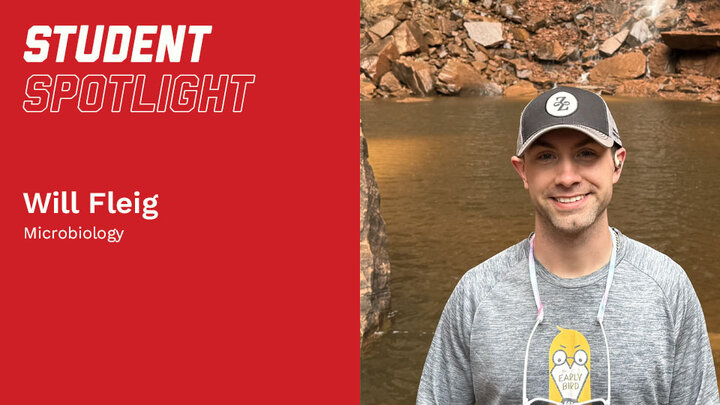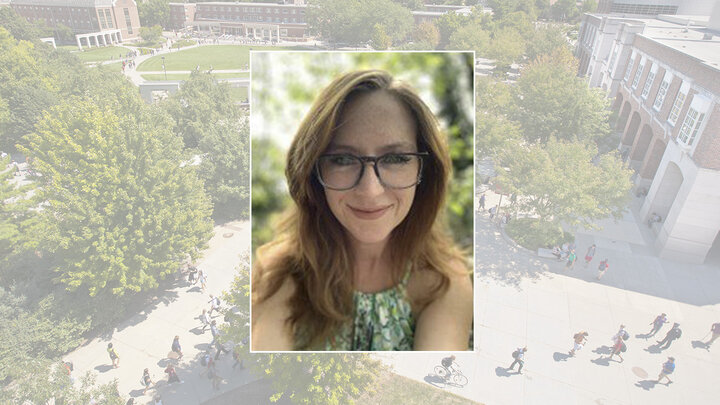Major: Microbiology
Minor: Spanish
Hometown: Lincoln, Nebraska
Will was born and raised in Lincoln and is a second-degree student at the University of Nebraska-Lincoln. He graduated previously with a Bachelor of Fine Arts in graphic design and is now a sophomore pursuing his second degree in microbiology with a minor in Spanish.
“I’m on the pre-health track, and I hope to work as a physician in the future,” Will said. “I currently work full-time as a graphic designer while taking a full course load. Apart from work, school, and research, I participate in volunteer work and do my best to find time for several hobbies, including tennis, guitar, and running.”
An interest he had when he was young helped him arrive at his second major. Will remembers as a kid when he first learned about the trillions of bacteria that live in the human body.
“Since then, I’ve been fascinated with the interplay between human health and the varying ecosystems of microbiota living within our bodies. I was motivated to study microbiology for the field’s potential to yield new clinical interventions through microbiome therapeutics, phage therapy, and CRISPR gene editing, among other recent innovations, Will said. “Microbiology provides a strong foundation in life science topics that will be useful to me in my future career.”
Will found his Spanish minor to be a natural fit with medicine and enjoys how it breaks up his science classes.
“While shadowing in the emergency department at a hospital, it struck me that many patients were unable to effectively communicate with the medical staff due to a language barrier. Since then, I’ve been motivated to learn Spanish in order to build trust with the many Spanish-speaking patients that I’ll surely treat in the future,” Will said. In the spring of 2025, Will worked on a research project with Lisa Pingault and Leslie Rault, research assistant professors in the Entomology Department. The project focuses on the microbiome and microbial pathogens of arthropods, specifically mosquitoes, which are carriers of bloodborne pathogens.
“A strong facet of my interest in microbiology lies in infectious disease, and I felt that this research project would provide me with a stronger understanding of disease prevention via population genomics,” Will said. “The entomological background lends a different perspective than what I would normally be exposed to in my coursework.”
Will’s confidence in his aptitude for science grew the first time he was given tasks in the lab and was able to perform them without any guidance or supervision. The impactful moment showed him that he was capable of applying his newfound skills and knowledge.
“Our lab examines the genetic adaptations that allow mosquitoes to develop resistance to conventional control methods, such as insecticide treatments, and investigates new approaches to interfere with the biological interactions between pathogens, vectors, and hosts,” Will said. “My time in the lab involves using extraction, PCR, and gel electrophoresis techniques to analyze specific genes associated with vector resilience and pathogen transmission. By studying these genetic and molecular pathways, we aim to develop more effective, targeted strategies to mitigate these disease vectors.”
Will has experienced many benefits from his time in the lab. He credits the opportunity for strengthening his organizational and note-taking habits. He also enjoys starting new classes and realizing that he already has some foundational knowledge in the subject due to his laboratory experience.
“Lab work has honed my ability to actively synthesize what I know from class and creatively apply that knowledge to novel problems,” Will said. “Gaining first-hand experience has strengthened my memory and understanding of topics from my class. I’m strongly motivated by the chance to apply what I learn in class and see the real-world value of facts and figures that may have initially seemed trivial.”
He sees his faculty sponsors, Professors Pingault and Rault, as being “excellent stewards” of his undergraduate experience.
“Drs. Pingault and Rault have treated me with patience while providing me [with an] on-ramp into the world of research. They knowledgeably answer my questions…and are gracious with me when I inevitably make mistakes in the lab,” Will said. “Most importantly, they ensure that I understand not only how to achieve good results, but the reasoning and theory behind the procedures I perform.”
In turn, he is now passing on what he has learned to other students, allowing him to reflect on how far he has come. “I recently have had the chance to begin training some newer assistants in the laboratory techniques that I perform, which was a fun full-circle moment,” Will said.
While most medical schools do not require undergraduate research experience, Will is grateful for the experiential learning he has taken part in at the College of Arts and Sciences, which has informed and reaffirmed his desire to be a physician.
“A primary goal of mine when returning to school was to confirm whether medical school is the correct path for me,” Will said. “My research experience has proven to me that I want to continue on my career path towards being a doctor, where I hope to eventually lead my own research in whichever field of medicine I decide to pursue.”




